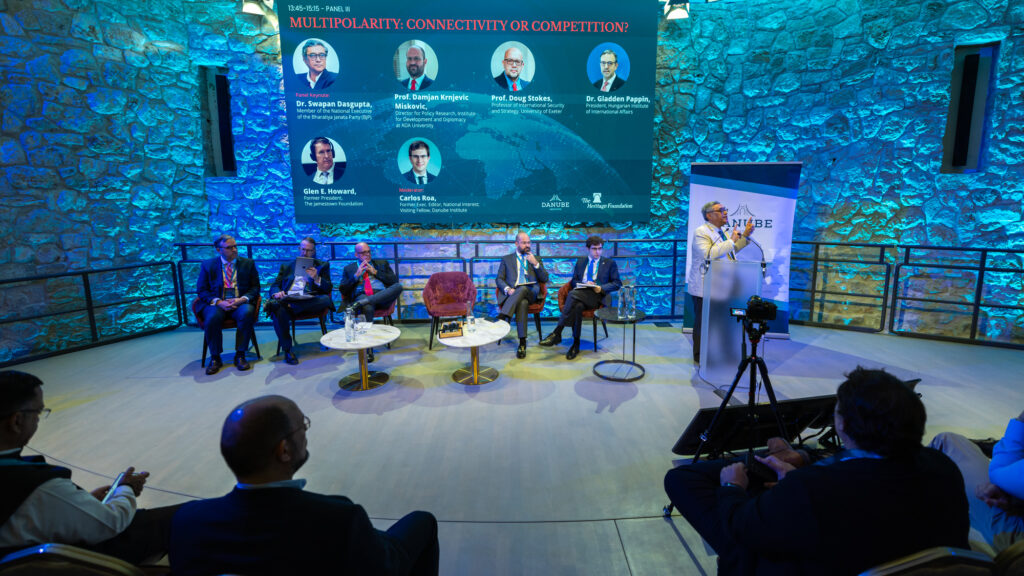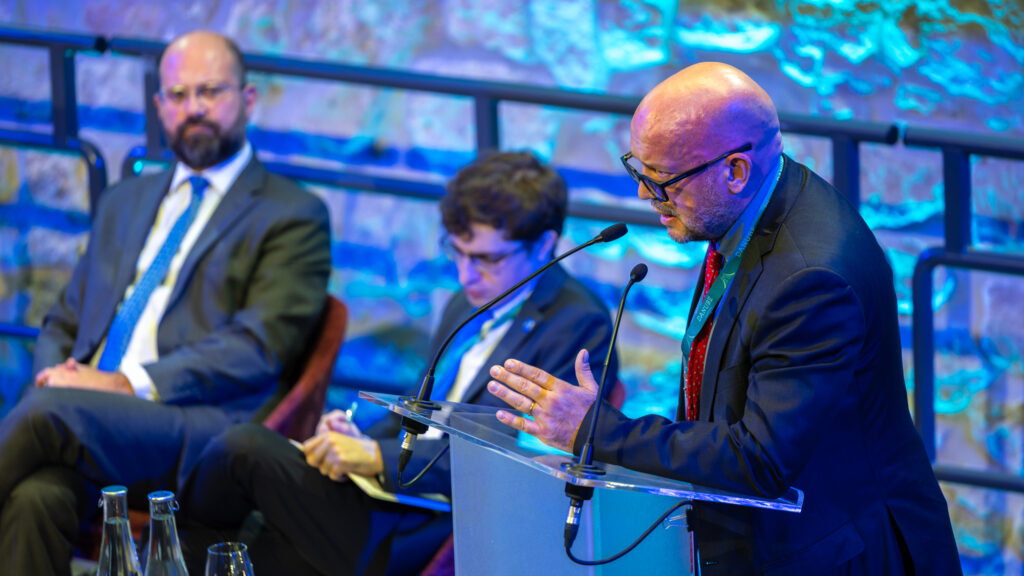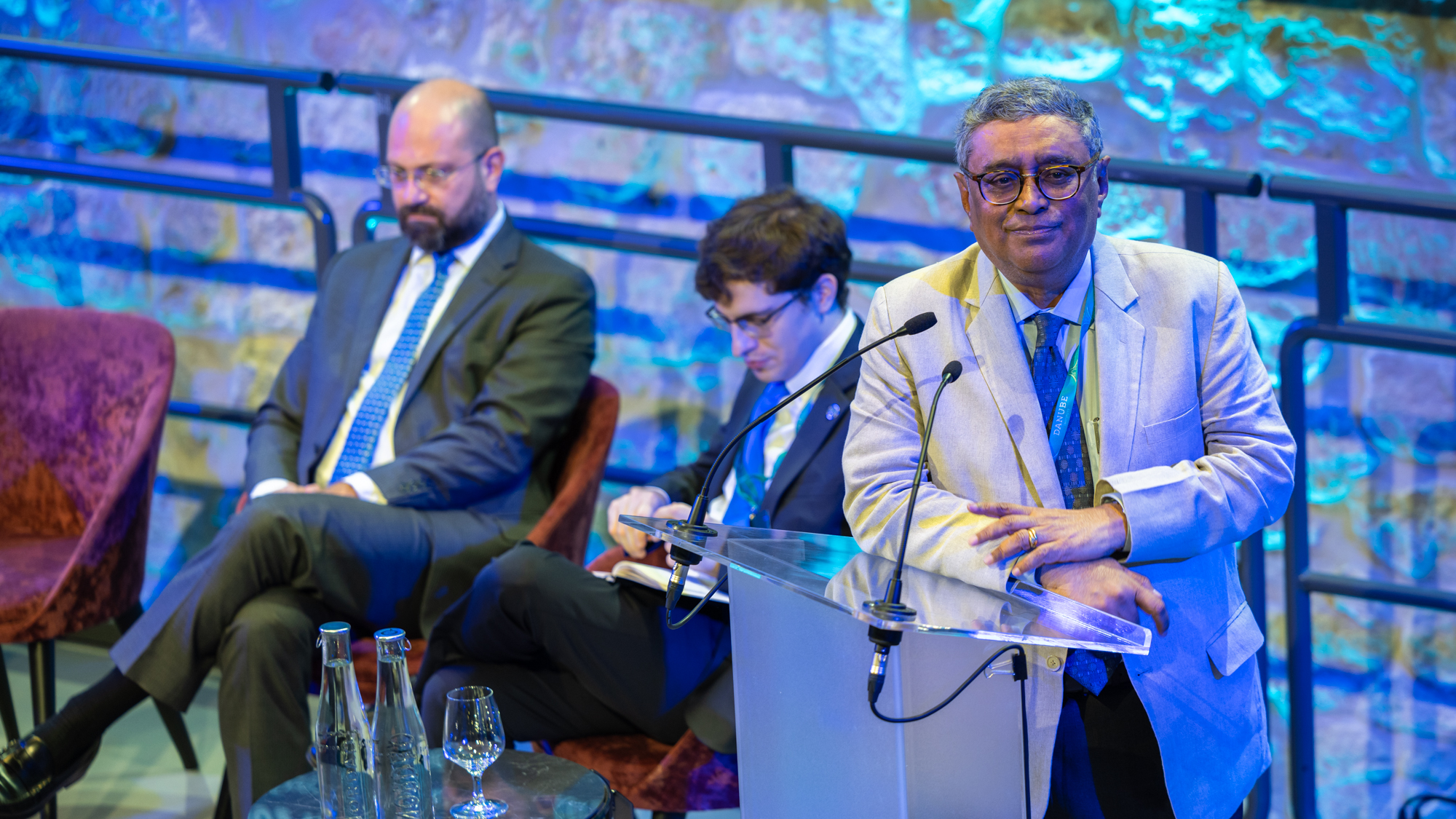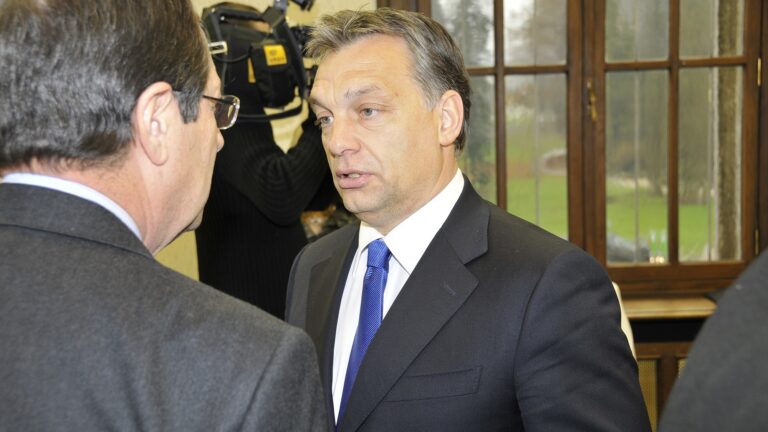The third panel of the 4th Geopolitical Summit held at the Danube Institute event was moderated by Carlos Roa, former Executive Editor of The National Interest and Visiting Fellow at the Danube Institute. Speakers included Dr Swapan Dasgupta, Member of the National Executive of the Bharatiya Janata Party (BJP), Professor Damjan Krnjevic Miskovic, Director for Policy Research at the Institute for Development and Diplomacy at ADA University, Professor Doug Stokes, Professor of International Security and Strategy at the University of Exeter, Dr Gladden Pappin, President of the Hungarian Institute of International Affairs, and Glen E. Howard, former President of The Jamestown Foundation.
The keynote was delivered by Dr Swapan Dasgupta, who began by praising Hungary, noting that the country has carved out a niche for itself as one of the foremost defenders of national identity, national sovereignty and civilization as the basis of nationhood. In terms of multipolarity, he stressed that one talks about it, context is immensely important, adding that it is always parallel with connectivity. He continued by explaining that in the past India could always represent equality, not with economic resilience, but by preaching to the world. This has ‘gone out the window’ and was replaced by a more pragmatic approach. They realized that partners that were impossible in the past are viable now, such as South Africa, and that the fact that India can have a relationship with Hungary need not to conflict with their relationship with Brussels. He cited as another example of India following its own strategic interests the Russo-Ukrainian war, regarding which India had to consider its own interests. When the sanctions on Russia were imposed, they did not go with it, instead, they bought more cheap energy from Russia, helping their domestic situation. ‘This is a time of manoeuvrability,’ he added. At the same time, national interest does not mean it is inimical to the cause of peace, he stressed. Summing up, he opined that each country must have the right to determine its own policies, while engaging with other nations. ‘Countries must talk to each other, confer, engage, keeping in mind that national sovereignty is very important,’ he concluded.

Professor Damjan Krnjevic Miskovic focused on the region known as Corridor Asia or the Silk Road region. He expressed that this region is of prime geopolitical and geo-economic significance that many Western countries do not acknowledge. He reminded that a number of connectivity projects either begin, cross, or end up in this region. According to Professor Krnjevic Miskovic, those who realize the heavy impact of this region are the ones who are going to ‘come out on top’ in this new ager of connectivity, especially as it is expected that 10 per cent of Europe’s oil and gas and 20 per cent of its renewables are going to come from this region in the near future.
Doug Stokes disagreed with those speaking before him, opining that China as a central player in Silk Road Asia is in fact on a path of decline. He cited the Asian country’s economic problems, its serious demographic issues, among other things, and reminded that many Western countries have realized the dangers of being dependent on Chinese manufacturing and are now cutting China out of their supply chains. According to Professor Stokes, it is also not correct to speak about China as a defender of its national interests; it is more appropriate to describe Beijing as defending its Communist Party’s interests. He noted that it is a ‘shallow multipolar international system’ if its key actor is China. While Hungary’s willingness as part of its connectivity strategy to engage with China is rational, however, the country needs to realize that the 21st century will probably remain a century revolving around the American axis, even in multipolarity, he stressed. On the other hand, Europe is also experiencing a shift in power, he reminded, as Germany greatly suffers from similar issues as China. He brought examples such as the population decline, and the mistaken decision to transition to lignite coal. The professor opined that the balance in Europe is shifting to the East, to Poland for example, which can be hugely beneficial for Hungary.

In his remarks Glen Howard referenced Balázs Orbán’s book Hussar Cut, noting that Hungary is opting for the hussar’s cut as a grand strategy, however, it that strategy may turn out to be the hussar’s paradox. He explained that Hungary outlined a strategy for itself, engaging in a balancing act with Russia, China, and the EU, all while being part of NATO. He referred to this as a hedging strategy. He added that part of the problem is that Hungary invests a lot of time and effort into luring Chinese investments, while also trying to play a role in ending the war in Ukraine. He referred to the Austro-Hungarian empire overextending its defence parameter, becoming open to imperial overstretch, suggesting that Hungary may be heading down the same road. He concluded that Hungary may need to reconsider his strategy, even if Donald Trump gets elected. In his opinion, although Trump will attempt to broker a deal with Russia, as the former President does not like to project weakness, if he cannot get a deal with Russia, he will most likely send immense support to Ukraine, and if this becomes a reality, Hungary will need to reidentify its stance towards the war.
The last speaker on the panel was Gladden Pappin, President of the Hungarian Institute of International Affairs. He remarked that after having lived in Budapest for some years, he sometimes ‘looks back over the ocean’, and realizes that something is wrong, especially now. In the last few years, for instance, in the US there have not been enough of such panels, which in his view reflects the deeper problem that the US is not well situated to navigate a new world order. Instead, it is heavily invested in the world order it has participated in the last 30 years. However, it still has immense resources to accommodate a new one but it is having problems identifying how to proceed in the a changing world. Mr Papping reminded of the the BRICS countries’ enormous economic strength, which is larger than that of the West combined, and opined that it is difficult for America to come up with a response to this power. He concluded that the problem is not that decisions that are made are bad, but unless there is a practical dealmaking approach with a Trump presidency, there is no indication that a shift is coming, and these countries may eventually overtake the US in many aspects.
More from the event:








